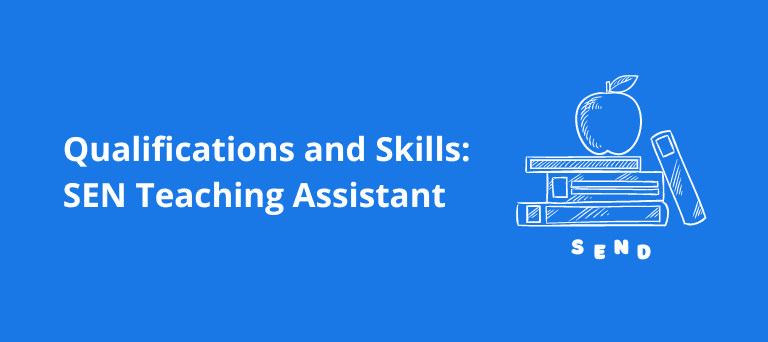Deborah A., Teacher
29 Aug 2023
5
min read

Have you ever wanted to make a real difference in the lives of students facing unique challenges? Then the role of a Special Education Needs (SEN) Teaching Assistant may be for you.
In today's educational landscape, Teaching Assistants (TAs) have become the unsung heroes of the classroom. They play an indispensable role in supporting teachers, deescalating challenging behaviour and ensuring the smooth functioning of each day. As the demand for skilled SEN TAs in the UK continues to rise, competition in this field has become fierce.
If you're reading this blog, chances are you're already captivated by the idea of becoming an SEN TA in the UK. Perhaps you're standing at the threshold of this incredible journey, unsure of where to begin. Fear not! In this guide, we will walk hand-in-hand as we explore the qualifications you need to pave the way to your dream career in SEN education.
Qualifications: SEN Teaching Assistant
Embarking on a fulfilling journey as a Special Educational Needs Teaching Assistant offers a multitude of pathways to choose from. The path you take is not bound by your academic or professional background, as there are always avenues available to acquire the necessary training and qualifications for a successful career as a SEN TA. Let's delve into the diverse avenues that lead to this role. Here are several options to consider:
A college course
An apprenticeship
Volunteering
Applying directly
Let’s discuss the above in detail:
College Courses
If you're passionate about becoming a Special Educational Needs (SEN) Teaching Assistant in the UK, a college qualification can be the first step on your exciting journey. Here are some college courses to consider: Level 2 and 3 Certificate in Supporting Teaching and Learning in Schools Level 3 Diploma in Childcare and Education Early Years Educator T Level in Education and Childcare Enrolling in these courses will not only provide you with valuable knowledge but also help you develop the necessary skills to excel in your role. What's even better is that some of these courses offer practical placements, giving you the opportunity to work alongside children with special educational needs. This hands-on experience will greatly enhance your understanding and abilities.
Apprenticeships
Another fantastic pathway to becoming a SEN Teaching Assistant is through apprenticeships. By choosing this route, you'll have the privilege of learning directly from experienced SEN teachers. Through practical tasks and guidance, you'll gain firsthand experience and a deeper understanding of what it's like to work in a school environment.
Relevant apprenticeships for aspiring SEN Teaching Assistants include:
Intermediate Early Years Practitioner
Advanced Early Years Educator
Advanced Teaching Assistant
One of the great advantages of apprenticeships is that there are currently no fixed entry requirements. However, having some GCSEs, particularly in English and Maths, will increase your chances of being accepted for an intermediate apprenticeship. Similarly, for an advanced apprenticeship, possessing five GCSEs at grades 9 to 4 (A* to C), including English and Maths, will be advantageous.
Volunteering
Volunteering is an incredible way to gain relevant experience and increase your chances of securing a job as a Special Educational Needs Teaching Assistant. You can make a meaningful impact by volunteering in the following areas:
In a Local School: Offer your time and skills to a nearby school. Working alongside dedicated professionals who support students with SEN will give you firsthand experience and insights into the field.
With Community Organisations: Explore opportunities to volunteer with community organisations that focus on assisting individuals with disabilities or learning difficulties. These organisations often collaborate closely with schools and can provide you with valuable experience and connections.
Engaging in volunteering goes beyond gaining valuable experience. It can also open doors to paid work opportunities and the chance to acquire relevant qualifications. Some organisations may offer training programs or pathways to obtain certifications that enhance your employability in the field. By volunteering, you not only contribute to the community but also invest in your own professional growth.
Direct Application
If you already have experience working with children who have disabilities or learning difficulties, you can take a proactive approach and apply directly for SEN teaching assistant positions. In these cases, there is no set requirement, as each school defines its own specific criteria based on their academic activities and learning standards.
To increase your chances of success, follow these steps:
Review Job Vacancies: Take the time to carefully review job vacancies to understand the specific requirements set by each school. This will help you tailor your application to highlight your relevant experience, skills, and qualifications that align with the school's needs.
Effective Communication: Establish open and effective communication with the school. Building a positive relationship and demonstrating your passion for supporting students with SEN can greatly enhance your chances of securing a position.
Remember, each step you take brings you closer to making a positive difference in the lives of students with special educational needs.
Additional Skills And Qualifications To Become An Sen Teaching Assistant
If you want to make your application stand out, it's important to showcase the skills necessary for the role of a SEN teaching assistant. These skills include patience, sensitivity, excellent communication, flexibility, emotional intelligence, active listening, and the ability to work well with diverse range of pupils and colleagues.
Demonstrating these attributes can significantly enhance your application. Possessing qualifications in British Sign Language or Makaton can be advantageous. In addition to the aforementioned skills and knowledge, there are other requirements to become a SEN teaching assistant in any school. These include:
Pass enhanced background checks
Assist with the preparation of learning materials (with the help of the class teacher)
Work both inside and outside the classroom environment with individuals or groups
Ensure the physical, social, and emotional welfare of children in your care
Create a stimulating environment
Provide feedback and information to fellow teaching staff and parents
Keep records and attend review meetings
Follow safeguarding procedures
Best of luck with the next step in your education career!



